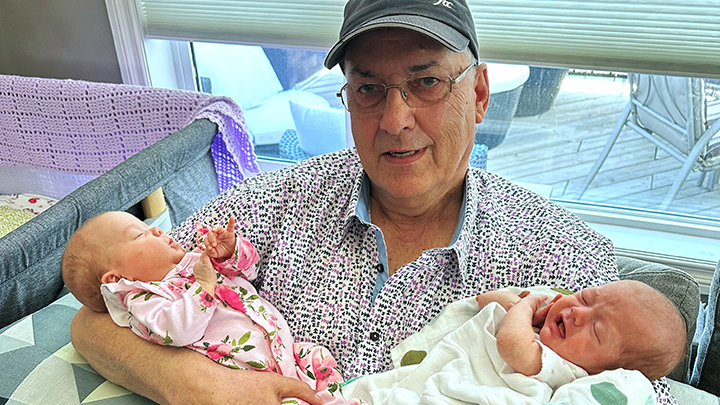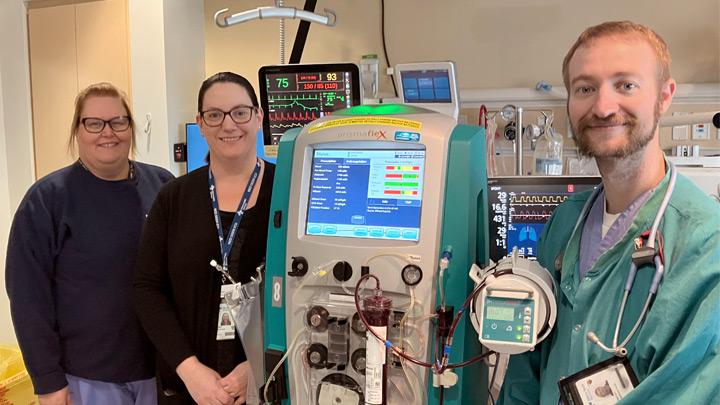

Jim Marek is grateful to be able to enjoy a loving cuddle with his twin granddaughters, Isabella and Arianna, following a life-threatening brush with Guillain-Barré syndrome. After five treatments of therapeutic plasma exchange (TPE) at Red Deer Regional Hospital Centre, the Delburne area farmer experienced significant improvement almost immediately. Photo supplied.

For Red Deer Regional Hospital Centre patients with neurological diseases like Guillain-Barré syndrome, therapeutic plasma exchange using a Prismaflex machine is often a lifesaver. Shown here with the Prismaflex are, from left: Kerry Oxtoby, ICU clinical resource nurse; Gillian Brown, patient care manager; and Darren Lynn, ICU registered nurse. Photo supplied.
Story by Jonathan Koch
RED DEER — Jim Marek felt something wasn’t right. After a busy September day moving cows, the Delburne area farmer woke up in the night feeling weak.
Thinking it was just fatigue, Jim went back to sleep. However, when he awoke in the morning, the weakness that started with his feet had spread to his entire body.
Barely able to make it to the phone, he called his son who lives nearby.
“I said, ‘You need to get over here, or phone an ambulance’,” says Marek. “I was just slowing down to nothing. Even my speech was slowing down. That was very scary.”
After arriving at Stettler Hospital and Care Centre, Marek’s condition continued to deteriorate. Unable to stand on his own, he was quickly sent to Red Deer Regional Hospital Centre, where he was assessed by a care team, including a neurologist and an intensivist.
Then came the biggest shock of al — he was diagnosed with acute Guillain-Barré syndrome (GBS). Guillain-Barré syndrome is a rare condition where nerves are attacked by antibodies created by the body’s own immune system.
This can lead to muscle weakness, loss of reflexes, numbness or tingling in the face and/or extremities and, in severe cases, paralysis or death.
Jim was admitted to the intensive care unit (ICU) and received therapy to introduce healthy antibodies to his bloodstream. However, as his weakness grew more severe, he became non-responsive and unable to move, requiring life support and assistance to breathe.
Concerned about the speed at which his condition was worsening, the care team decided Marek needed therapeutic plasma exchange (TPE).
Therapeutic plasma exchange is a procedure used to treat neurological diseases like Guillain-Barré. The patient’s blood is filtered continuously by a Prismaflex machine, the same kind used for kidney dialysis, to gently replace harmful antibodies with healthy blood-plasma proteins. Marek received five treatments of TPE — and experienced significant improvement almost immediately.
“After the first treatment I wiggled my toe, and my son Cole said, ‘Dad, are you doing that? Do it again! I’m going to get the nurse’,” says Marek. “So that was sort of the beginning."
Within 10 days, Marek could move his legs and amble short distances with a walker, before his transfer out of the ICU.
His care team was impressed with how quickly Marek bounced back, says Kerry Oxtoby, a clinical resource nurse in ICU.
“He was a rock star,” adds Oxtoby. “He received treatment very quickly, and there was such a dramatic change in his health. It became very clear to the team early on that TPE was the best course.”
The hospital has supported around 20 TPE patients with the Prismaflex since the Red Deer Regional Health Foundation purchased two machines in 2018. According to Gillian Brown, patient care manager, the key to a positive outcome with GBS is to eliminate the length of time in between initial symptom onset and treatment.
“Often GBS symptoms come on slowly, so it isn’t always obvious what’s wrong,” says Brown. “We were fortunate that Jim came in immediately, so he could be diagnosed and treated right away.”
Marek is back on the farm where he continues his recovery, having come through his ordeal without any neurological ill-effects. Why he was afflicted remains a mystery. However, with GBS unlikely to reoccur, he says every day since coming home is a good day.
“When I was in the hospital, my second-oldest son came in and told me they were going to have twin girls,” adds Marek. “So, I gotta stick around a while.”